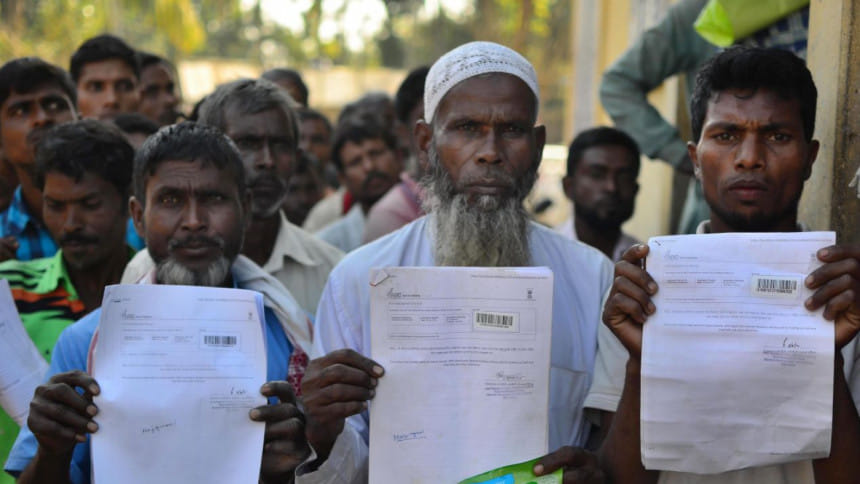Is ethnic cleansing coming to India?

Seventy-one years after the partition of India, and 47 years after the former East Pakistan became Bangladesh, one of the legacies of the messy division of the subcontinent has returned to haunt the country. The current crisis over the publication of a National Register of Citizens (NRC) in the Indian state of Assam has cast doubt on the citizenship—and the future—of some four million people, and threatens to undermine peace in the region.
The departing British partitioned India in 1947 on the basis of religion: they created a Muslim state, Pakistan, out of Muslim-majority provinces in the west and east of India. In 1971, after a brutal and genocidal campaign by the Pakistani army drove some ten million refugees to India, East Pakistan seceded to form Bangladesh. Once Pakistan was defeated in that war, most of the refugees returned to the newly independent Bangladesh, though some remained in India, where they assimilated seamlessly.
While migrants to the Indian state of West Bengal assimilated easily among their fellow Bengalis, those who settled in the north-eastern state of Assam faced greater challenges, owing to linguistic, cultural, and religious differences with the majority of their new neighbours. By the 1980s, Assamese students—angry at the prospect of losing land and job opportunities—were staging mass protests, which occasionally erupted into violence.
Assam became all but ungovernable. A pair of savage massacres of Bengali Muslim migrant groups—one of which killed some 3,000 in the Assamese village of Nellie and other villages in 1983—exposed the depth of the crisis. Finally, in 1985, then-Indian Prime Minister Rajiv Gandhi concluded an "Assam Accord," which brought an end to the "Assam Agitation" by pledging to deport all those who had migrated illegally to the region from Bangladesh after 1971.
This was easier said than done. Over the years, an assortment of tribunals failed to identify more than a few thousand of the so-called illegal migrants. Yet no concrete action was taken to fulfil the guarantees of the Assam Accord. Instead, the problem was left on the back burner for decades.
Then, in 2014, the hard-line Hindutva (Hindu nationalist) government led by Prime Minister Narendra Modi and his Bharatiya Janata Party (BJP) was elected, and the process was revived. When the main phase of the court-directed and government-supported exercise was concluded, the second draft of the NRC—a list of people who could prove that they had antecedents in Assam before 1971—was published in late July.
The BJP pretends that this is a neutral exercise, emphasising that the Supreme Court supervised the process, even as it celebrates the identification of "foreigners." But the move is anything but unbiased, as it will determine who can own land, hold jobs, and vote in BJP-ruled Assam. And whatever the size of the final NRC—there is still time to appeal its findings and correct some errors—it is already clear that those ultimately excluded will be overwhelmingly, if not entirely, Bengali Muslims.
In fact, it has been suggested that a principal purpose of reviving the NRC process has been to strip as many Bengali Muslims as possible of the right to vote ahead of the next general election. In a state of some 30 million, disenfranchising four million people could have a major impact on the BJP's electoral fortunes, as it has scant support among India's Muslims. But it is almost impossible to tell a Bangladeshi Muslim and an Indian Bengali Muslim apart. Also, the legal implications of the move to strip so many inhabitants of their voting rights have yet to be assessed, and court challenges await.
In any case, the Bengali Muslims excluded from the NRC stand to lose more than their voting rights. Some speak glibly of deporting them to Bangladesh. But there is no bilateral deportation agreement in place, and Bangladesh has made clear that it assumes no responsibility for people who are not on its territory. The last thing India needs is to create a migration crisis or, worse, try to force deportations to Bangladesh—one of the few neighbours with which the BJP government has managed to maintain good relations.
Still, it seems possible that those who are excluded from the NRC will be driven from their homes in Assam—which they may have inhabited for more than four decades—with no place to go. Some have suggested that India establish camps to house these people until they can return to Bangladesh—a prospect that horrifies human-rights groups, not least because there is no guarantee that that day will ever come. More fundamentally, is it really justifiable to strip people of the rights they have exercised in democratic India for most of their lives?
So far, the crisis created by the NRC has been nonviolent. But as tensions mount, the risk of an eruption is growing. Now, the government must confront difficult questions. Is an accord reached in 1985 to address actions taken since 1971 really the best framework to resolve the issue in 2018? Can India's democracy afford to disregard the human rights of people who have been living on its territory for decades? As laudable as it is to protect India's sovereignty and the integrity of its citizenship, does it justify throwing millions of lives into limbo?
There are no clear answers to these questions, despite what passionate voices on both sides of the argument would have one believe. What is clear is that, at a time when the BJP's majoritarian assertiveness is already raising serious concerns, the decisions the government makes regarding the NRC will shape the future of India's turbulent democracy—for better or for worse.
Shashi Tharoor, a former UN under-secretary-general and former Indian Minister of State for External Affairs and Minister of State for Human Resource Development, is currently Chairman of the Parliamentary Standing Committee on External Affairs and an MP for the Indian National Congress.
Copyright: Project Syndicate, 2018.
www.project-syndicate.org
(Exclusive to The Daily Star)





Comments